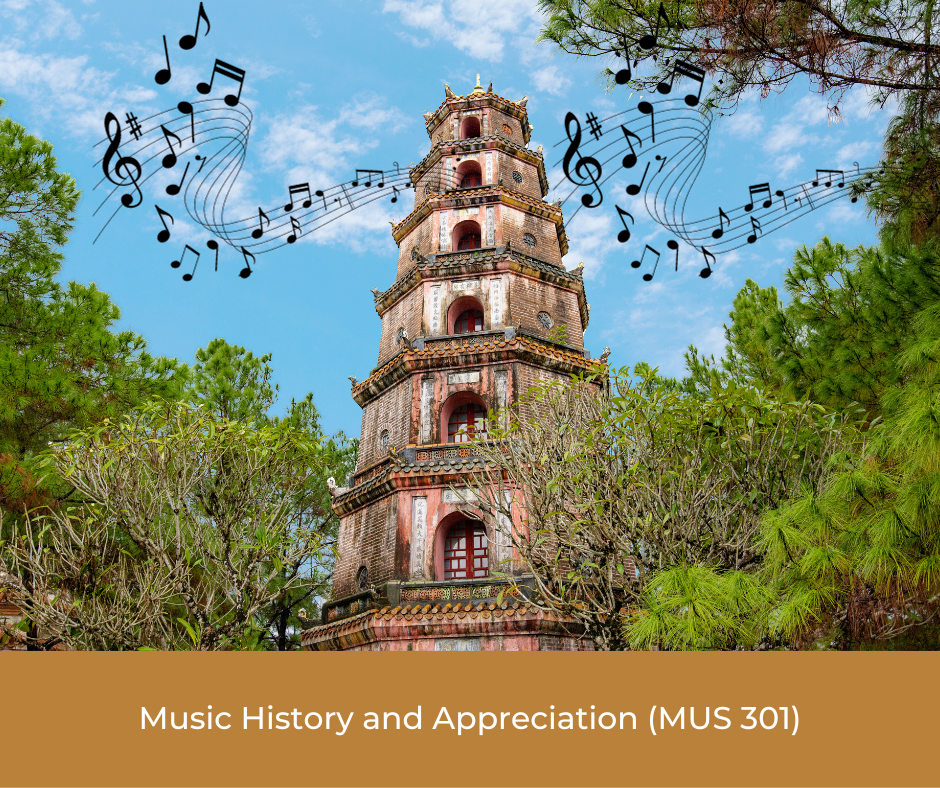Course Description – Music History and Appreciation (MUS 301):
MUS 301 is a comprehensive survey course that delves into the rich tapestry of music history, spanning from ancient civilizations to contemporary genres. Students will embark on a journey exploring the evolution of musical styles, the contributions of significant composers, and the profound cultural contexts that have shaped music throughout the ages, including a special focus on Punjabi Music.
Outline of Major Content Areas:
- Ancient and Medieval Music:
- Exploration of music in ancient civilizations.
- The development of Gregorian chant and early musical notation.
- Renaissance and Baroque Eras:
- Examination of the flourishing music of the Renaissance.
- The emergence of Baroque music and key composers.
- Classical and Romantic Periods:
- Study of the classical compositions of Mozart, Beethoven, and Haydn.
- The romantic era’s emotional and expressive music, including works by Chopin, Schubert, and others.
- 20th Century and Contemporary Music:
- Exploration of diverse musical movements, such as jazz, blues, and rock.
- Contemporary genres, including electronic and experimental music.
- Punjabi Music Tradition:
- In-depth study of Punjabi musical traditions, including Bhangra, Giddha, and Shabad Kirtan.
- Exploration of renowned Punjabi musicians and their contributions.
- Global Music Traditions:
- Introduction to various world music traditions and their influence on contemporary music.
- Cultural and Social Contexts:
- Analysis of how historical events and cultural shifts influenced musical composition.
Course Learning Outcomes:
Upon successful completion of MUS 301, students will be able to:
- Demonstrate a comprehensive understanding of the evolution of music from ancient times to contemporary genres, with a special focus on Punjabi Music.
- Identify and analyze significant composers, compositions, and musical movements from various historical periods and cultural backgrounds.
- Understand the cultural, social, and historical contexts that influenced musical development in Punjabi and global traditions.
- Recognize key musical styles, forms, and genres from different eras, including Punjabi musical genres.
- Develop critical listening skills to appreciate and evaluate diverse musical works, including those from Punjabi traditions.
Methods for Assessing Student Learning:
Assessment in this course will encompass a variety of methods to gauge students’ comprehension and appreciation of music history, including:
- Examinations: Periodic quizzes and final exams assessing knowledge of key composers, historical periods, and musical styles, including Punjabi Music.
- Research Projects: Investigating and presenting on specific composers, musical movements, and Punjabi musicians.
- Listening Assignments: Analyzing and critiquing musical compositions from various eras and traditions, including Punjabi music.
- Class Participation: Engaging in discussions and group activities related to the course material, including Punjabi music traditions.
- Music Appreciation Journals: Reflecting on personal responses to select musical pieces, including Punjabi music.
These assessments will enable students to develop a deep appreciation for the history of music and its profound impact on culture and society across the ages, with a specific emphasis on Punjabi music traditions.
